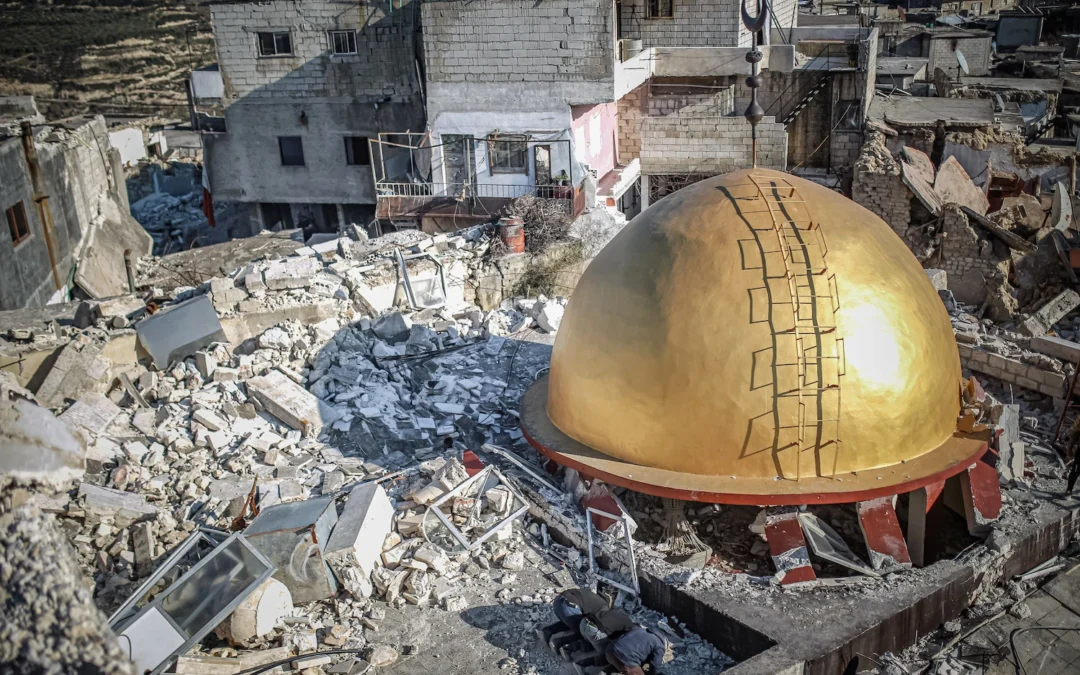An aerial view of collapsed buildings as search and rescue efforts continue in Idlib, Syria on February 13, 2023. MUHAMMED SAID/ANADOLU AGENCY VIA GETTY IMAGES
Article initially published on February 15, 2023 in Foreign Policy and written by Annie Sparrow.
Providing humanitarian aid is contingent on humanitarian access. The manipulation of access is a defining feature of the long-running Syrian conflict and itself a key driver of humanitarian need.
The lack of access to northern Syria has made clear that there is a dramatic difference in the scope and effectiveness of the international humanitarian response in Turkey compared with Syria. In Turkey, the earthquake generated a massive international response: thousands of humanitarian workers, dozens of planes and ships carrying supplies, financial and logistical capacity from dozens of countries.
By contrast, in rebel-held northwestern Syria, few international aid organizations or supplies exist. The lethal impact of the earthquake is compounded by the Syrian and Russian governments’ efforts to limit U.N. assistance across the border from Turkey, which has served as a lifeline for millions of Syrians dependent on U.N.-coordinated aid. That the Syrian government, under pressure, has temporarily consented to additional cross-border U.N. aid from Turkey, after all hope of saving people from collapsed buildings has been extinguished, doesn’t change the need for a new approach to such humanitarian emergencies.
Currently, this enclave is home to 4.5 million Syrians, nearly 25 percent of Syria’s population packed into just 4 percent of its land. Their massive humanitarian needs predated the earthquake. Years of Syrian and Russian bombardment had already damaged or destroyed 65 percent of the region’s infrastructure, leaving most people without safe water, sanitation, sewage, or electricity.
Before the earthquake, 4.1 million people were fully dependent on humanitarian aid, including 1.8 million displaced people living precariously in so-called sites of last resort. Post-earthquake, humanitarian needs have multiplied. Hope of finding survivors is gone. The urgent need now in northwestern Syria is for an immediate influx of humanitarian assistance.
Although the Syrian government has belatedly been arm-twisted into agreeing to allow two additional border crossings for three months, there is no guarantee that in three months the agreement will not be withdrawn. And this temporary solution does nothing to address the broader problem of governments restricting humanitarian aid to score political points.
Since a U.N. Security Council Resolution is no longer required to authorize additional crossings, Russia avoids a showdown at the Security Council under international pressure and can focus on its Ukraine campaign—but still gets to carry out its threat to shut down cross-border aid at the next renewal session in July. Instead of just two additional crossing points, Assad could have authorized the opening of all five border crossings from Turkey into northwestern Syria. Since all are Turkish-controlled, there is no danger of aid going to Kurdish forces.
Even though Bashar al-Assad has now yielded to international pressure to open two new border crossings (a total of three), as announced by U.N. Secretary-General António Guterres on Monday, the bigger issue is the world’s ability to truly respond to humanitarian need. The Syrian government has never been and is not now a reliable source of aid to areas under opposition control. The only reliable and sustainable avenue for aid to civilians throughout northern Syria has been deliveries across the Turkish border.
In his Feb. 7 article in Foreign Policy, Charles Lister identified the U.N. cross-border mechanism as cumbersome. He rightly pointed out that relying on it alone would cost lives. But he misguidedly recommended supplementing it with cross-line aid—that is, aid sent via Damascus and across the internal front lines.
That assumes cooperation from the Assad government. Yet since the beginning of the civil war, the Syrian government has routinely manipulated humanitarian assistance to harm and deprive people in opposition-held areas of the country. As early as mid-2011, as the United Nations asked the Syrian government for access to areas cut off from vital services by the Syrian military, civilians suspected of smuggling food and medicines there were arrested. The charge? Providing humanitarian assistance.
In late 2012, when the U.N.-led humanitarian response from Damascus began, the Syrian government’s strategy of withholding aid extended to the money, food, and medicines that flowed into the country. During 2013, as even limited attempts to send aid cross-line failed to reach areas besieged by the government, U.N. agencies belatedly realized that the government would never allow cross-line convoys to get to scale. That is when the U.N. sought to deliver aid cross-border from Turkey.
But hyperconservative U.N. lawyers have interpreted the world body’s powers narrowly to allow cross-border aid deliveries only with the consent of the recipient country or the approval of the U.N. Security Council.
In 2014, under enormous pressure, Russia allowed the Security Council to approve delivery of aid through four border crossings. Since January 2020, in an effort to bolster Assad’s rule, Russia has used veto threats to reduce the renewal period to six months and to restrict cross-border deliveries to a single point, claiming that the Syrian government could deliver.
In fact, cross-line aid accounts for less than 2.5 percent of aid to rebel-held northwestern Syria. U.N. agencies are currently reporting that the Assad government has stopped removing the most important items from humanitarian convoys, but given the government’s long history of manipulating and blocking aid, there is no reason to believe that this sudden reform will last were cross-border aid to stop.
Between October and November 2022, 1,377 trucks delivered cross-border aid to northern Syria, compared with 34 trucks sent cross-line. Although active hostilities have diminished since the March 2020 cease-fire, humanitarian needs have grown. In December 2022, the U.N. humanitarian agency estimated a total of 15.3 million people in need—the highest since the war began. That enormous need, even in government-controlled parts of Syria, undermines Russia’s claim. Yet in January, Russia again rejected proposals to add a second border crossing and reiterated its intention to shut down cross-border aid completely.
As a result, before the earthquake, the U.N. humanitarian response from Turkey could bring only a trickle of aid into northwestern Syria. Quake damage was said to have closed that lifeline crossing for a critical three days. On Day 4, instead of the asked-for digging equipment, fuel, and food, a prearranged U.N. convoy arrived with blankets and electric heaters (useless without electricity). Rescue workers in Idlib were furious. On Day 5, another U.N. convoy of 14 trucks carried similar supplies. Out of fuel and deprived even of the thermal imaging and sensing devices used a few miles north in Turkey to find remaining survivors, the chief of the White Helmets, the principal rescue agency, effectively called off the search for surviving victims of the quake.
Lister urges opening other border crossings, but the U.N. won’t use nonauthorized points and doesn’t seem capable of distinguishing earthquake requirements from routine needs. U.N. cross-border aid clearly should be supplemented, not by the wholly unreliable Syrian government but by other concerned governments operating without the self-imposed constraints of U.N. humanitarian operations.
Lister takes a step in this direction, but his suggestion that the U.S. government partner with the Syrian Democratic Forces (SDF) to bring in aid would only antagonize Turkey. Rightly or wrongly, Ankara considers the SDF as equivalent to the Kurdish forces that it has been fighting inside Turkey, the Kurdistan Workers’ Party (PKK). Nor should the United States (or any government) partner with a fighting force for humanitarian purposes.
A better role for the United States and other concerned governments would be to directly provide the earthquake response to northwestern Syria. The U.S. government has capacity across all branches of its military to leverage its assets for humanitarian purposes, as it did for the earthquake in Haiti and the tsunami in Aceh, Indonesia.
It could use its massive reserves to provide immediate needs (15,000 tents, 150,000 mattresses, 30 million liters of heating fuel), procurement power for special items (earth-moving equipment to remove the rubble, septic tanks, prefabricated cabins for schools and clinics), and the technical experts to assess building safety and repair damaged water plants as well as logistics and delivery mechanisms. Hospital ships could be deployed to ports in southern Turkey. They could also serve affected coastal regions under government control, providing both direct service and accountability to ensure the delivery of aid.
Direct U.S. involvement would also set an important precedent for more immediate humanitarian access in future crisis situations than the United Nations’ current approach with its deadly delays. If the U.N. persists in the narrow interpretation of its powers, concerned governments should start providing cross-border aid themselves.
Of course, they should now make use of the two new border crossings temporarily allowed by the Syrian government, which should be dedicated to the earthquake response, but they should not accept that as a limit to their range of action. Dozens of countries are already in Turkey, which has allowed humanitarian access to Syria.
Direct governmental aid would surmount constraints imposed by U.N. lawyers for U.N. action, as well as the semiannual drama of the Russian government threatening to veto renewed Security Council authorization. And it would fast-track the speed and scale of the response that is needed immediately.
Desperate and immediate human needs should not be subject to the United Nations’ conservative deference to sovereign prerogative. Amid the devastation, this massive earthquake creates a moment to respond as a global community. Instead of the narrow focus on negotiating piecemeal border crossings with Syria or Russia, a broad and generous international humanitarian response is urgently needed.
Read full article on foreignpolicy.com


Recent Comments